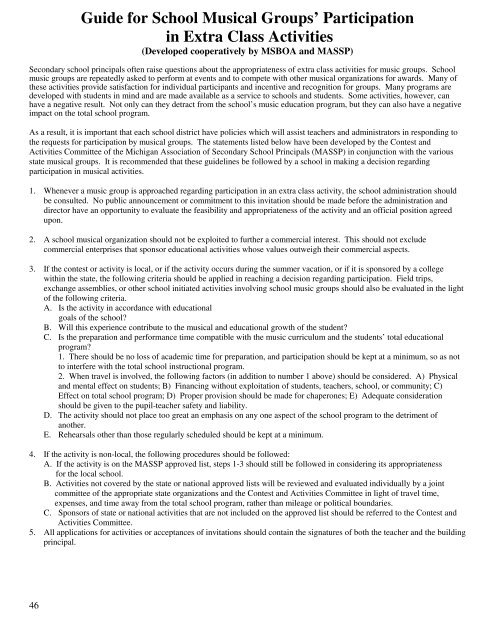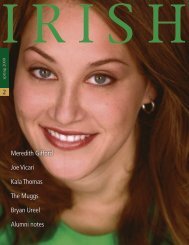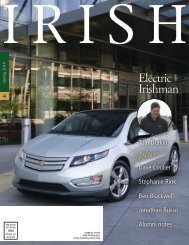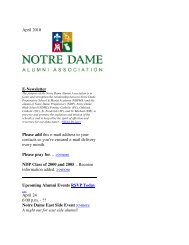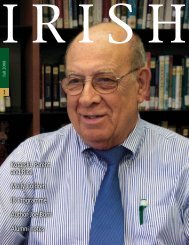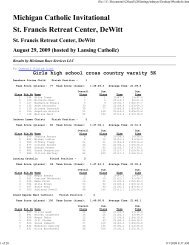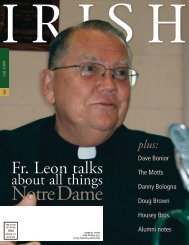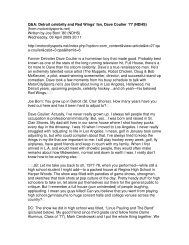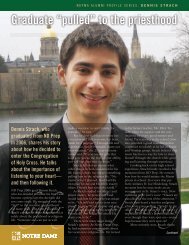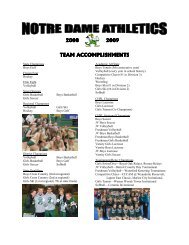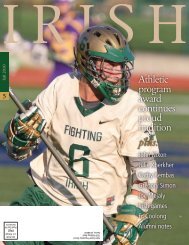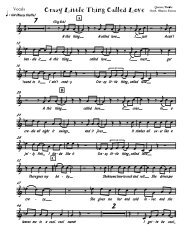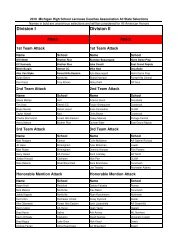2011 – 2012 YEARBOOK
2011 – 2012 YEARBOOK
2011 – 2012 YEARBOOK
You also want an ePaper? Increase the reach of your titles
YUMPU automatically turns print PDFs into web optimized ePapers that Google loves.
Guide for School Musical Groups’ Participation<br />
in Extra Class Activities<br />
(Developed cooperatively by MSBOA and MASSP)<br />
Secondary school principals often raise questions about the appropriateness of extra class activities for music groups. School<br />
music groups are repeatedly asked to perform at events and to compete with other musical organizations for awards. Many of<br />
these activities provide satisfaction for individual participants and incentive and recognition for groups. Many programs are<br />
developed with students in mind and are made available as a service to schools and students. Some activities, however, can<br />
have a negative result. Not only can they detract from the school’s music education program, but they can also have a negative<br />
impact on the total school program.<br />
As a result, it is important that each school district have policies which will assist teachers and administrators in responding to<br />
the requests for participation by musical groups. The statements listed below have been developed by the Contest and<br />
Activities Committee of the Michigan Association of Secondary School Principals (MASSP) in conjunction with the various<br />
state musical groups. It is recommended that these guidelines be followed by a school in making a decision regarding<br />
participation in musical activities.<br />
1. Whenever a music group is approached regarding participation in an extra class activity, the school administration should<br />
be consulted. No public announcement or commitment to this invitation should be made before the administration and<br />
director have an opportunity to evaluate the feasibility and appropriateness of the activity and an official position agreed<br />
upon.<br />
2. A school musical organization should not be exploited to further a commercial interest. This should not exclude<br />
commercial enterprises that sponsor educational activities whose values outweigh their commercial aspects.<br />
3. If the contest or activity is local, or if the activity occurs during the summer vacation, or if it is sponsored by a college<br />
within the state, the following criteria should be applied in reaching a decision regarding participation. Field trips,<br />
exchange assemblies, or other school initiated activities involving school music groups should also be evaluated in the light<br />
of the following criteria.<br />
A. Is the activity in accordance with educational<br />
goals of the school<br />
B. Will this experience contribute to the musical and educational growth of the student<br />
C. Is the preparation and performance time compatible with the music curriculum and the students’ total educational<br />
program<br />
1. There should be no loss of academic time for preparation, and participation should be kept at a minimum, so as not<br />
to interfere with the total school instructional program.<br />
2. When travel is involved, the following factors (in addition to number 1 above) should be considered. A) Physical<br />
and mental effect on students; B) Financing without exploitation of students, teachers, school, or community; C)<br />
Effect on total school program; D) Proper provision should be made for chaperones; E) Adequate consideration<br />
should be given to the pupil-teacher safety and liability.<br />
D. The activity should not place too great an emphasis on any one aspect of the school program to the detriment of<br />
another.<br />
E. Rehearsals other than those regularly scheduled should be kept at a minimum.<br />
4. If the activity is non-local, the following procedures should be followed:<br />
A. If the activity is on the MASSP approved list, steps 1-3 should still be followed in considering its appropriateness<br />
for the local school.<br />
B. Activities not covered by the state or national approved lists will be reviewed and evaluated individually by a joint<br />
committee of the appropriate state organizations and the Contest and Activities Committee in light of travel time,<br />
expenses, and time away from the total school program, rather than mileage or political boundaries.<br />
C. Sponsors of state or national activities that are not included on the approved list should be referred to the Contest and<br />
Activities Committee.<br />
5. All applications for activities or acceptances of invitations should contain the signatures of both the teacher and the building<br />
principal.<br />
46


